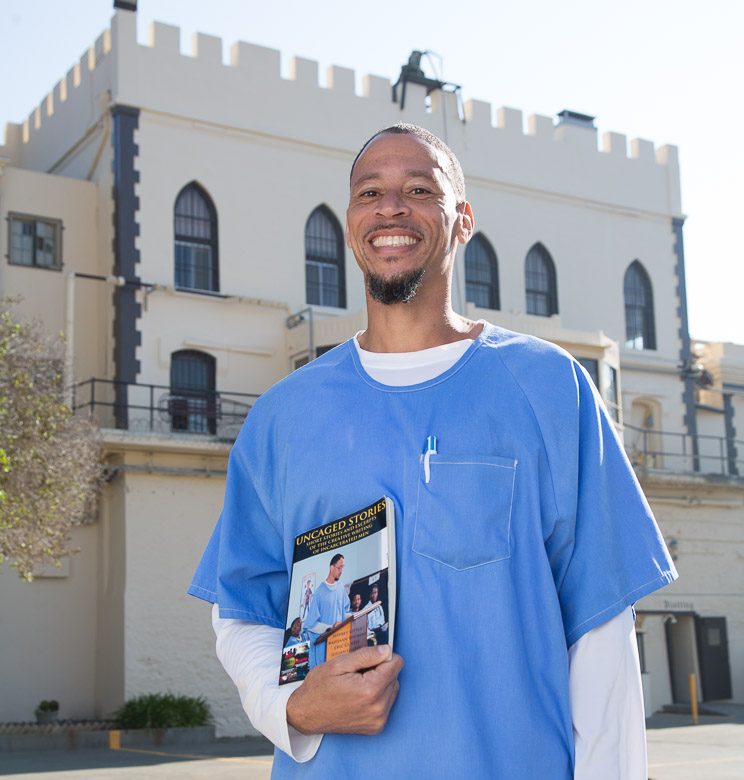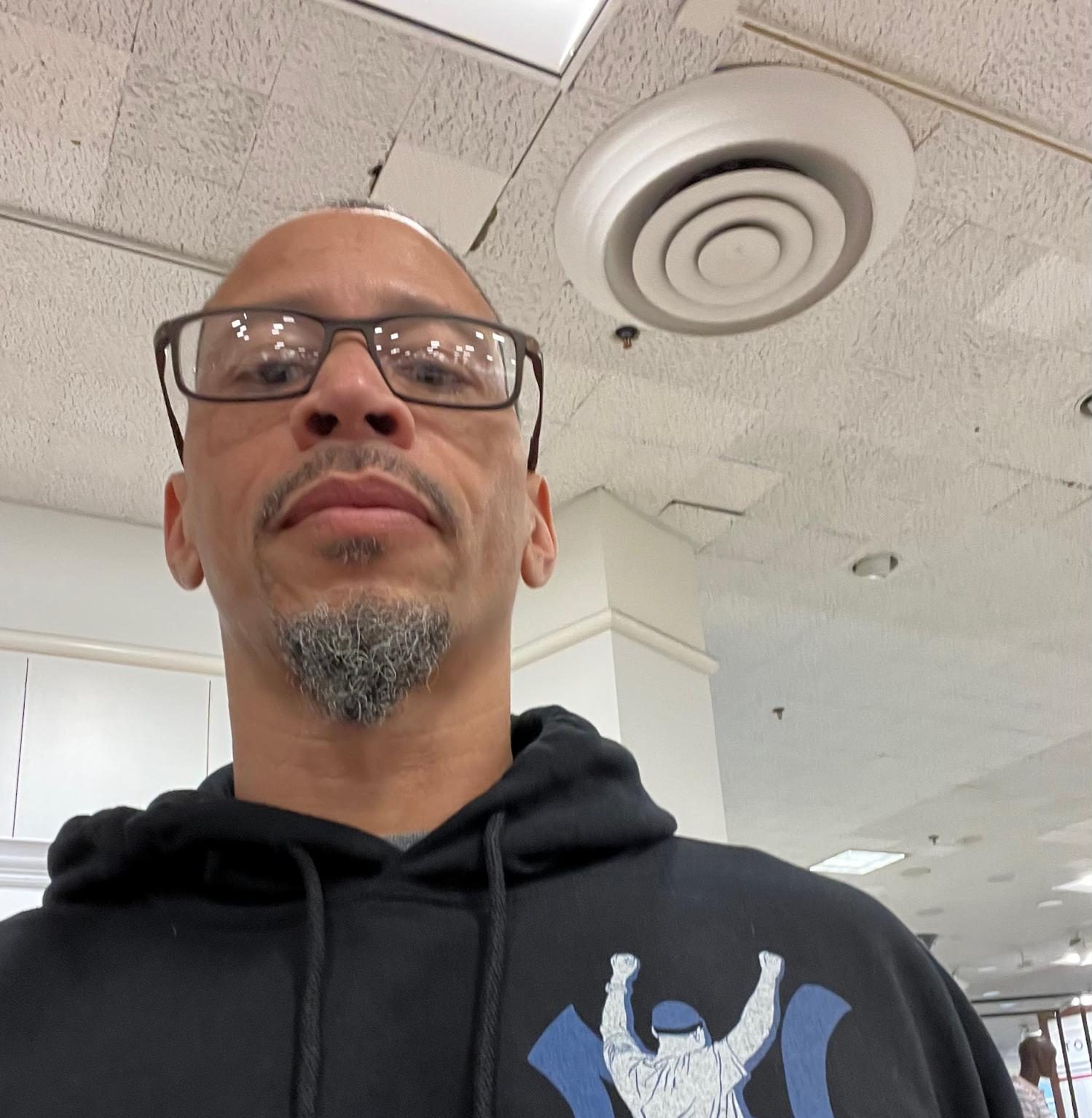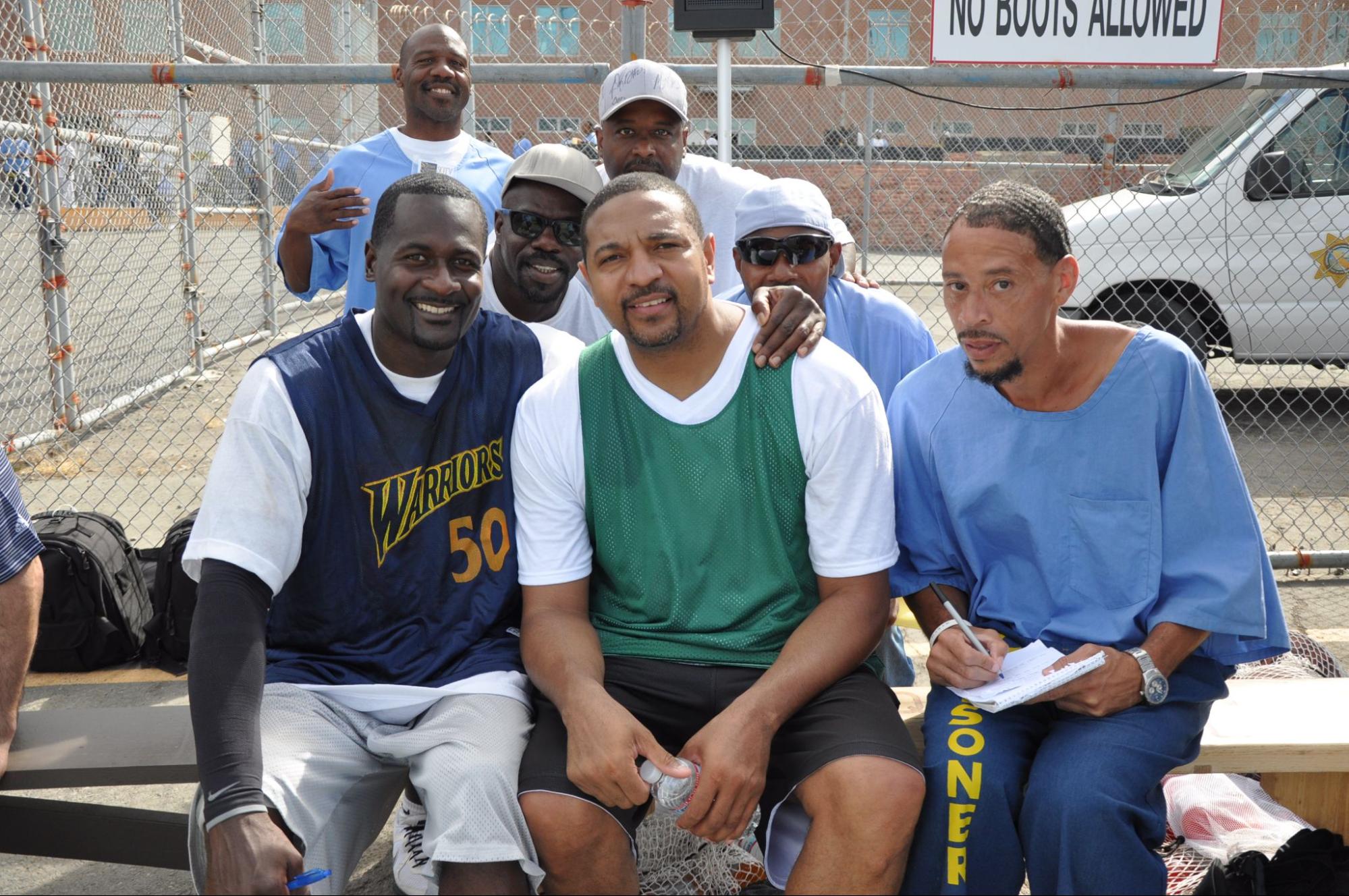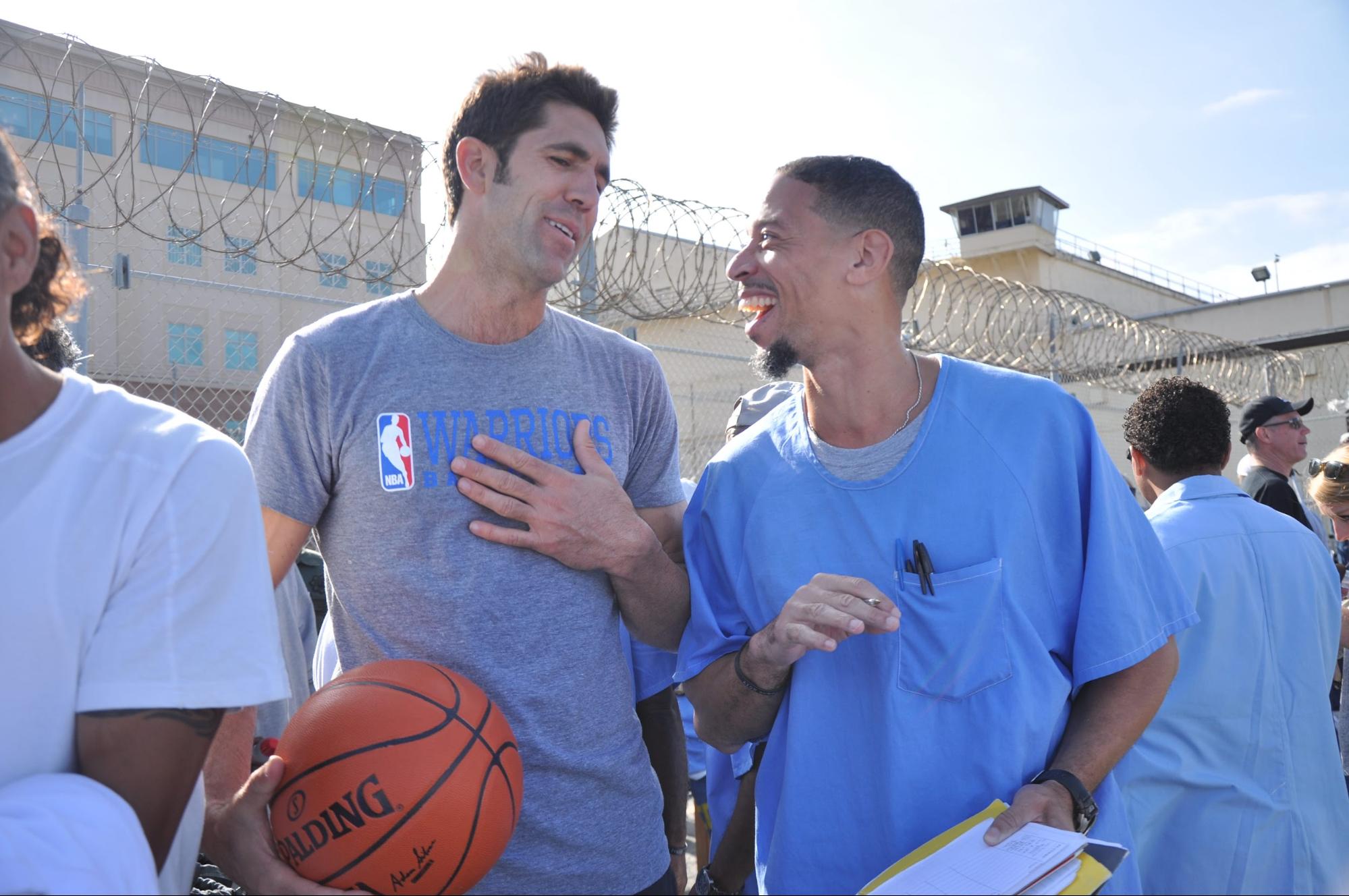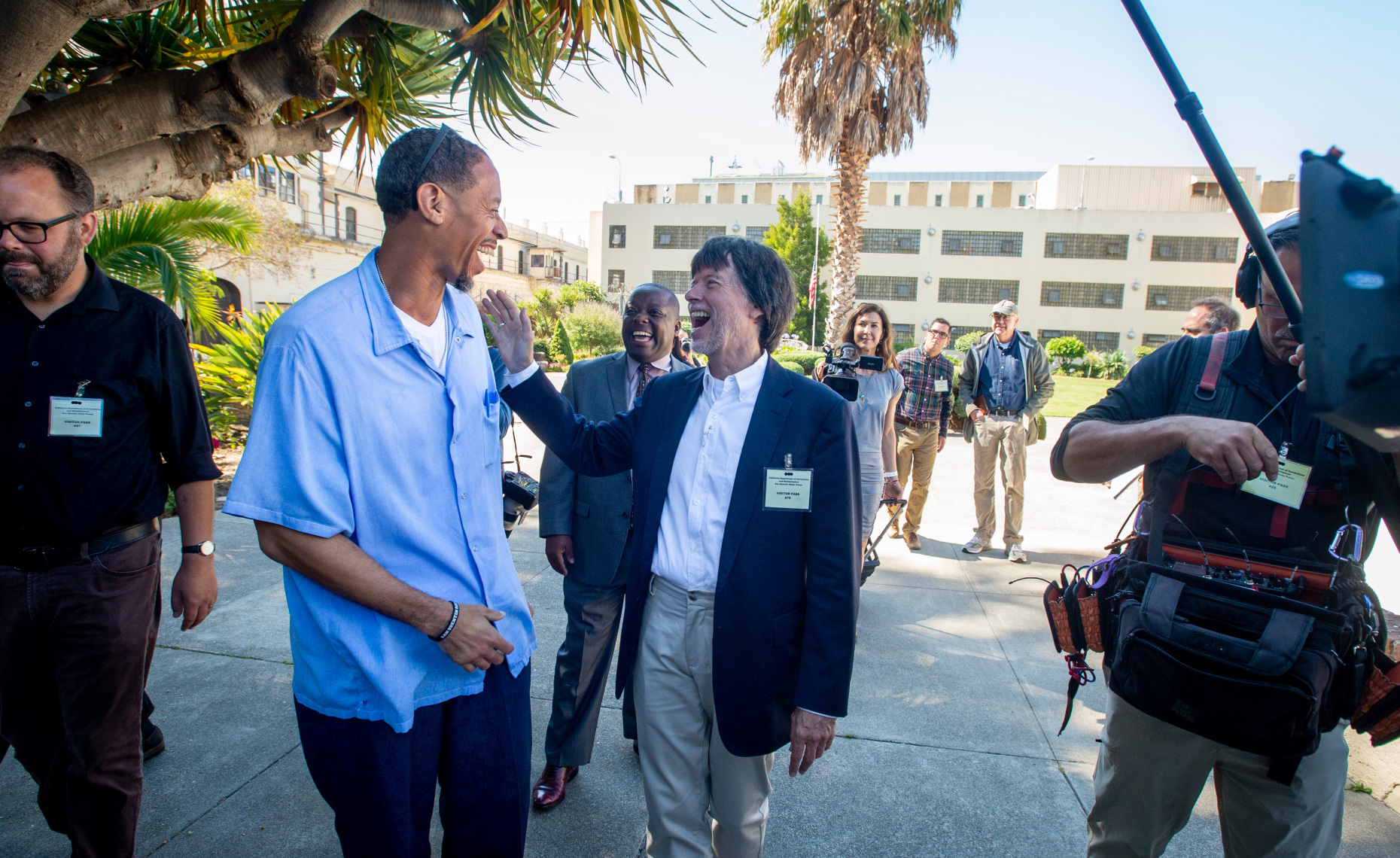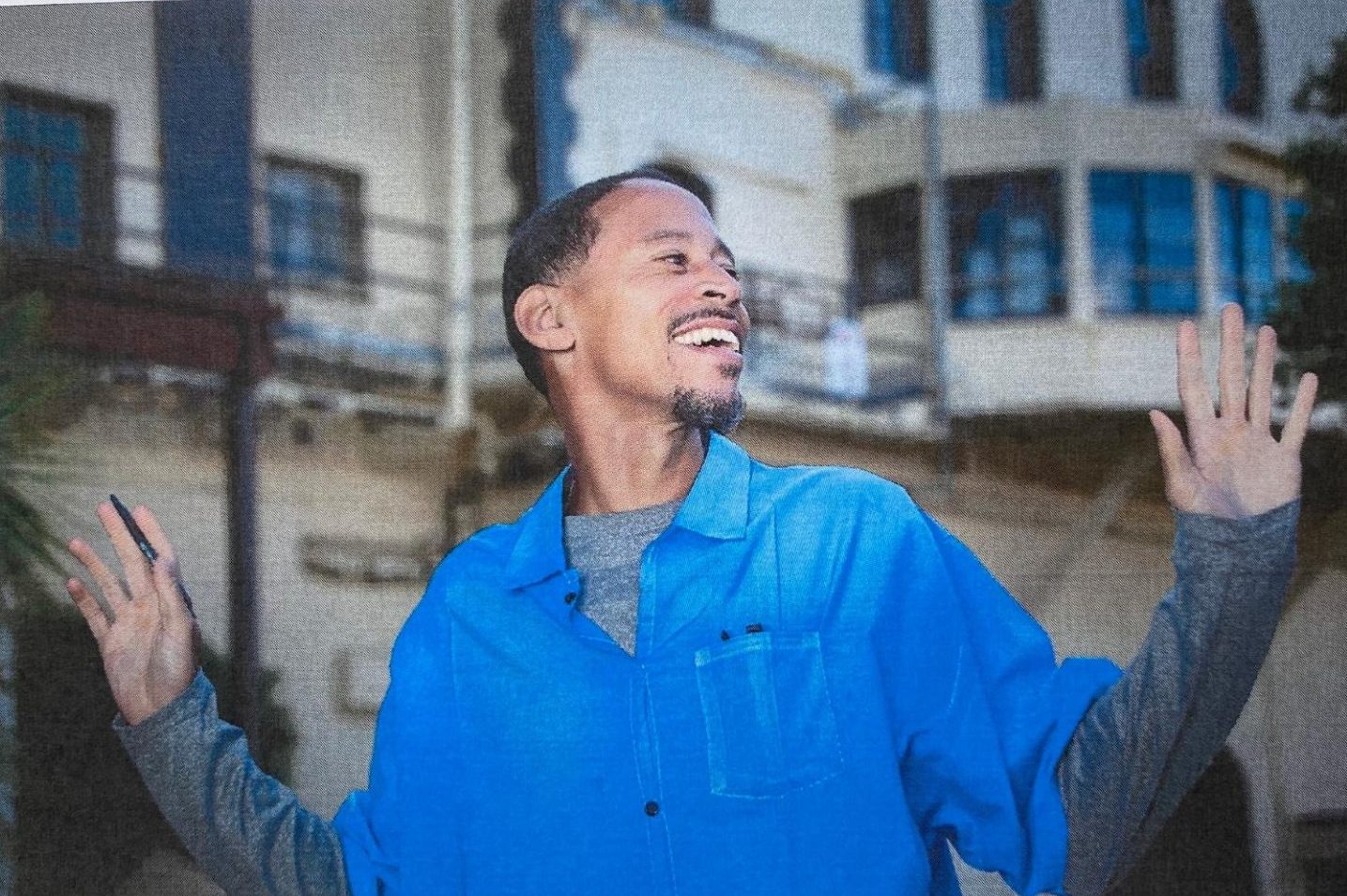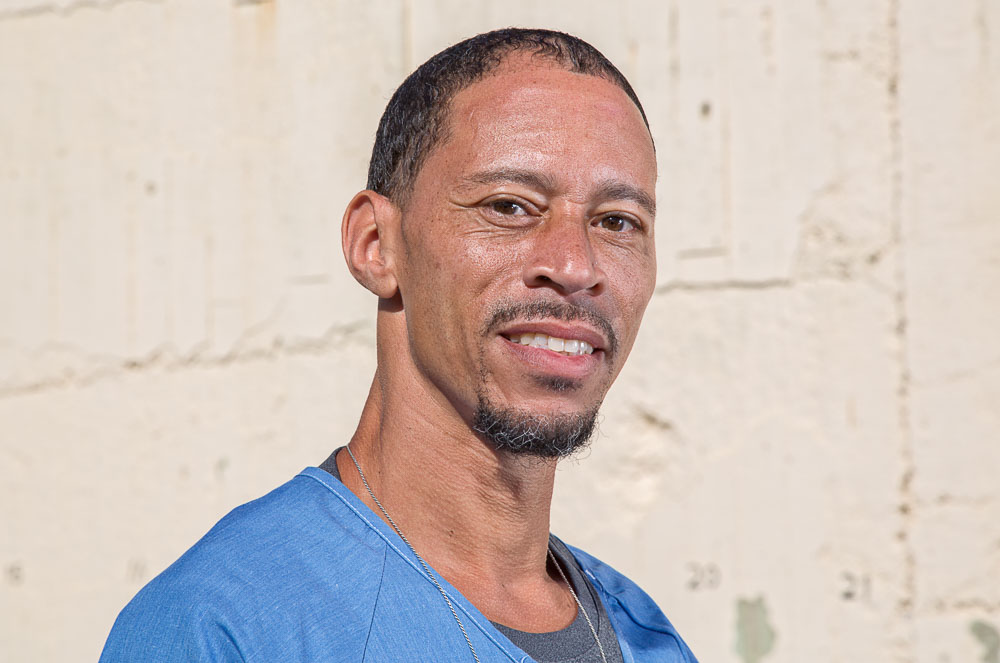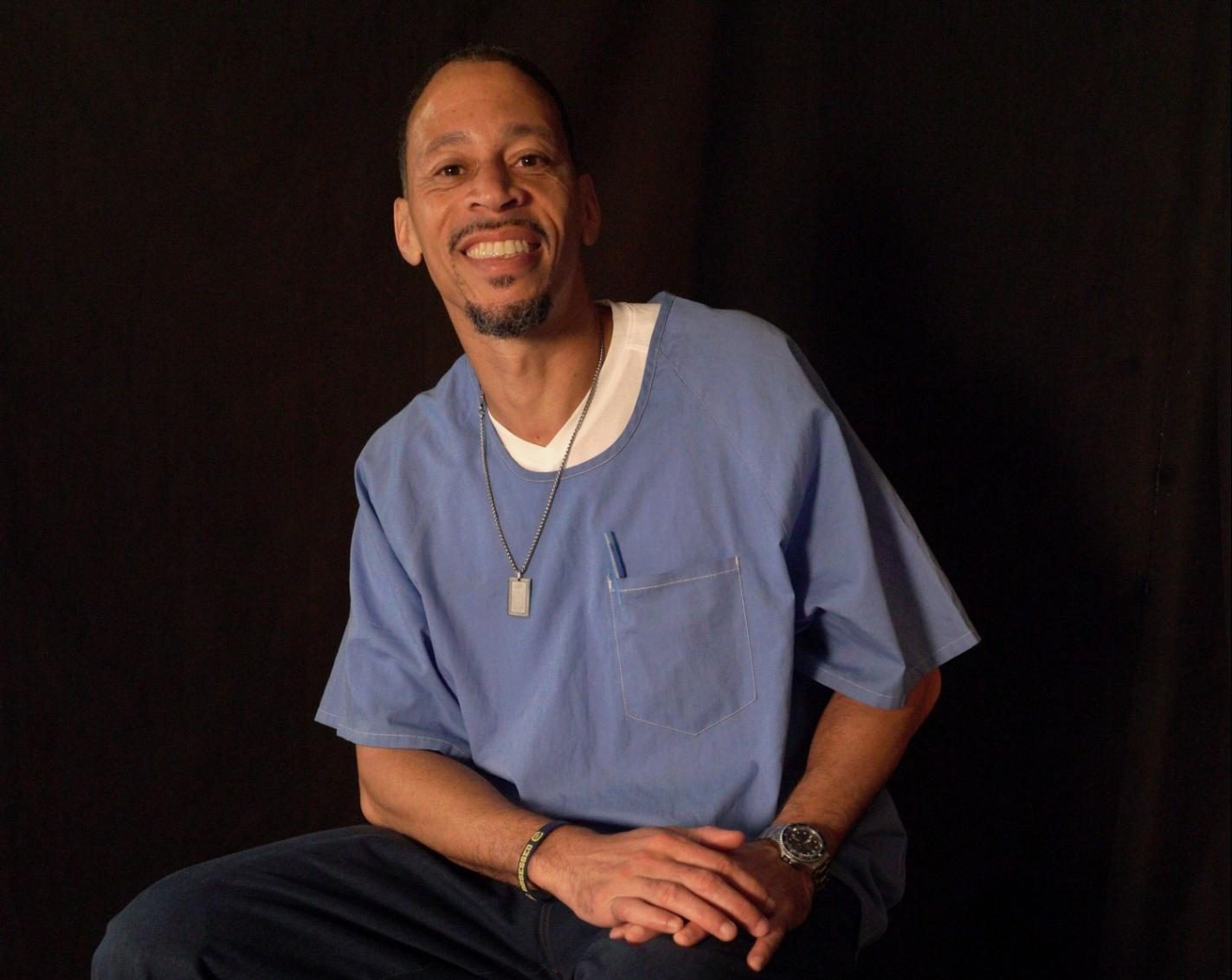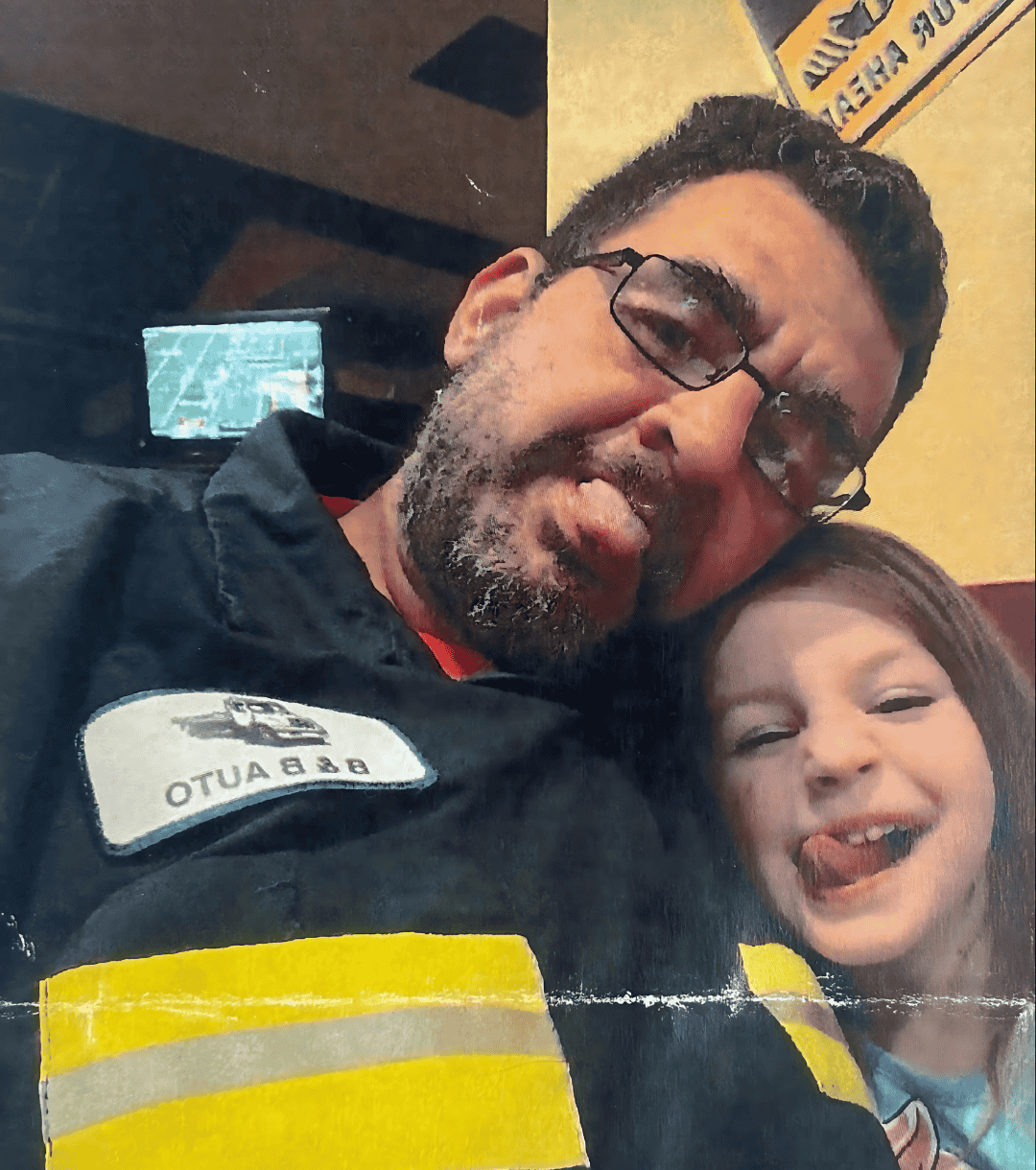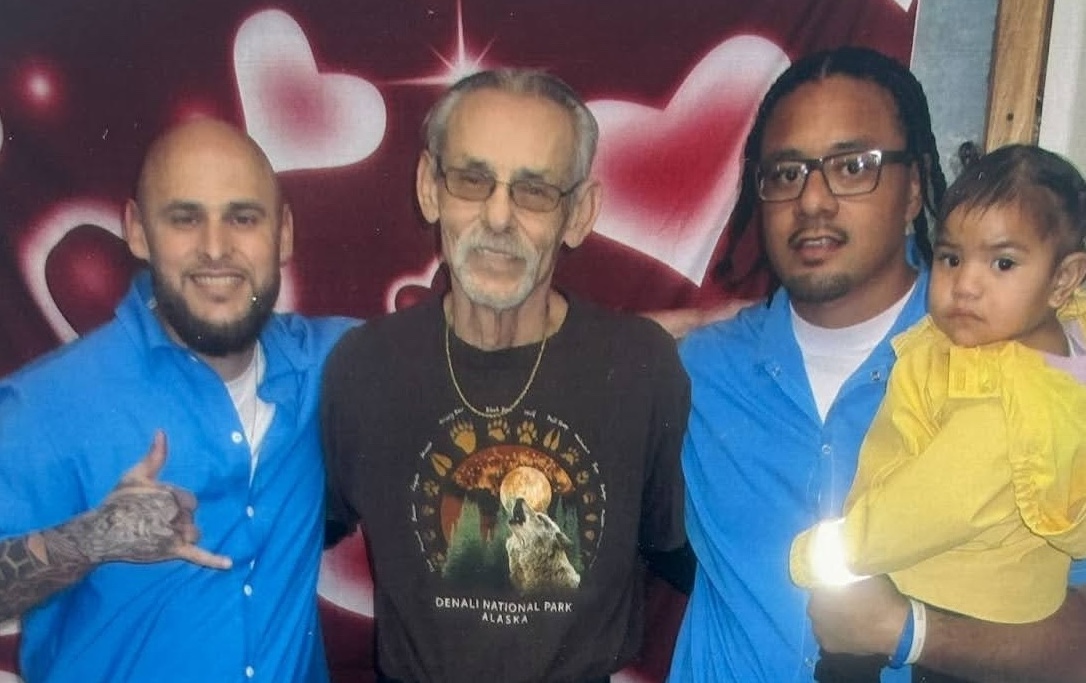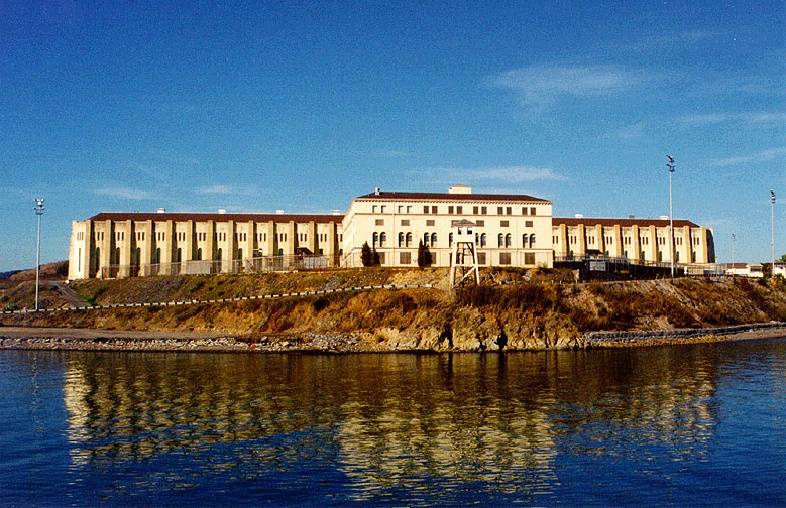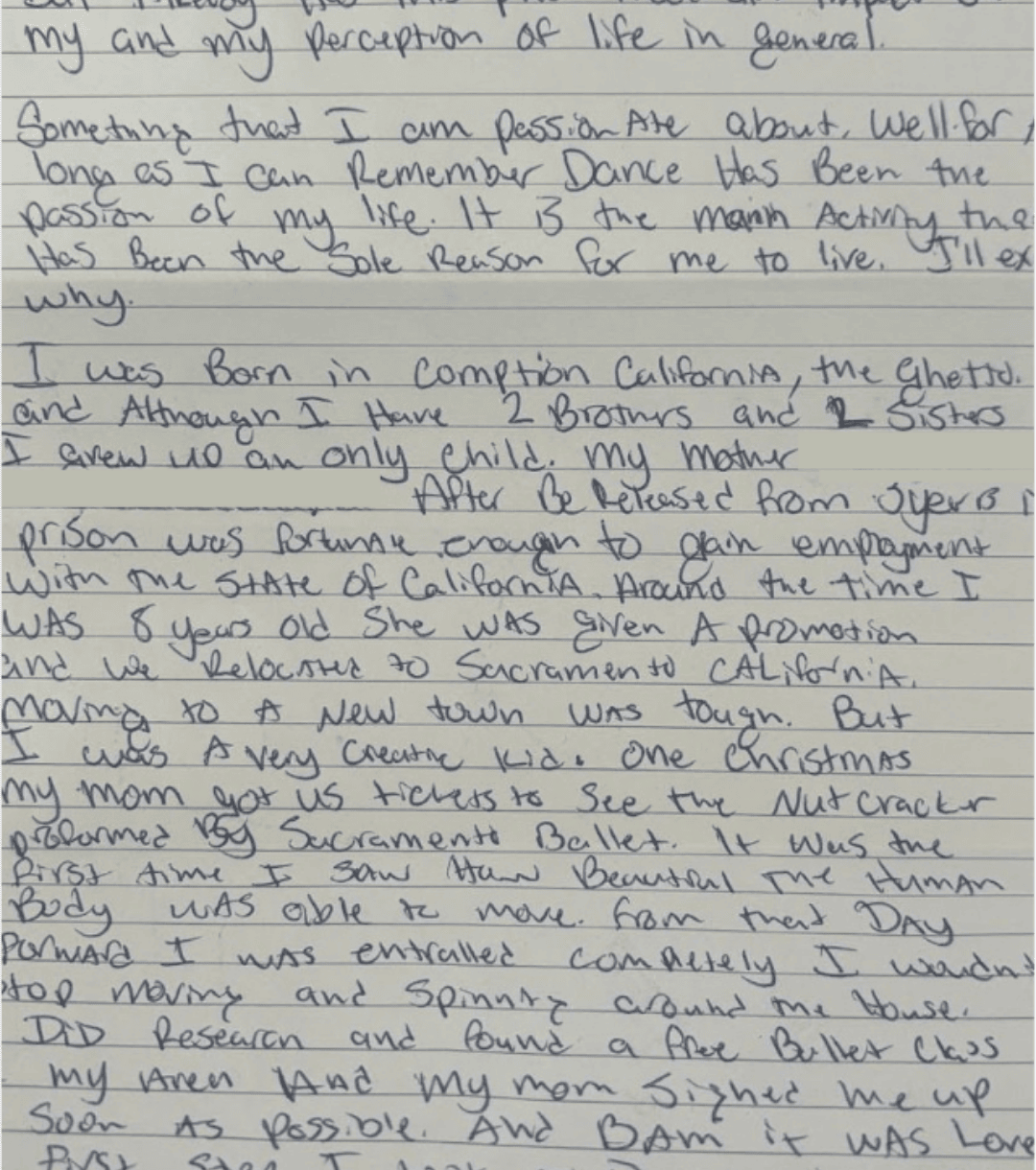Rahsaan Thomas
Released after 22 years
Diane: How has it been going and what have you been doing?
Rahsaan: That’s a big question. I’m working for Ear Hustle. Working on getting funding for my films. Working on one of my films for a film festival. And I’m having some fun. I’ve been to two Warriors games, two Brooklyn Nets games, I’m going to a Giants-Dodgers game on Monday, and I just got back from New York after a 10 day trip. I got to speak at Columbia for a screening of a film called, What These Walls Won’t Hold directed by Adamu Taye Chan. I’m a co-producer, and it just made it to the San Francisco international film festival. It’s gonna be played on April 15th and 16th. We’re up against W. Kamau Bell and his documentary about growing up mixed-race. I’ve been to a lot of dinners. I went on a dinner tour with a whole bunch of people that supported me while I was inside. I got to see my family. I got to see my son and spend a few days with him when I was in New York.
Diane: You’ve been all over the place!
Rahsaan: Yeah and a lot of Zoom meetings.
Diane: Let’s start from the beginning. Share with us your parole board hearing.
Rahsaan: I didn’t go with the expectation that I would get a date on the first try; since that’s really difficult. I didn’t let the fact that it’s difficult discourage me. I prepared for it, prepared for it, prepared for it… and it worked out. I went in there, and I was really honest in a way I thought they weren’t going to like, but I guess honesty is the best policy. At the end of the hearing, when they found me suitable, I was really happy. I think the six months wait to actually walk out the door is like a blessing because you know people don’t have a clear path to freedom. While you’re going through the review process there’s a chance they can change their mind, so you feel the pressure of that. And just not knowing the date- how do you plan and not have a date? When should family come? When do you do this? When do you do that? Not having the actual date is kind of nerve wracking. But it went pretty fast now that it’s over with. I went out the doors to a beautiful reception. There were probably about 40 people there. Got like 40 hugs the day I got out, a lot of hugs. Hugs used to be contraband and no longer contraband, so that was great.
Diane: Were you nervous the night before you were released?
Rahsaan: Not really nervous, just anxious. I just wanted to be out and done with the process. That morning there were five of us waiting to be released, and you can’t be released in front of the prison unless you have a ride. If you don’t have a ride, then they take you straight to the bus stop. Reports were coming in that there were all these people out there waiting since 6am and it was 9:30 already and they didn’t let me go yet. I’m like, “Uh what’s going on? I got these people out waiting in the cold.” They were waiting for one guy. They didn’t know whether he had a ride or if they had to take him to the bus stop. He was supposed to have a ride, but his people didn’t check in. They weren’t there. They were doing all this stuff to try to find these people, and I was just like, “Can’t you just take us and come back for him?” Finally they made some sense and at about ten they took us, but I felt bad that the whole time people were out there waiting.
Diane: How did you feel stepping out of the van?
Rahsaan: I felt blessed. I never felt so much love in my life. Ironically, one guy did go straight to the bus stop and didn’t have that feeling at all. Other people got that feeling but from less people. It was just beautiful to have it from so many people and I am just trying to figure out how to duplicate that for everybody, because that was just beautiful to have that much love and support.
Diane: What was the first thing you wanted to do?
Rahsaan: EAT! I went to the nearest restaurant and called my mom and my son on the way. I had an iPhone waiting for me in front of the prison, so that was amazing. I planned ahead. So I was able to call all these people on my way to the restaurant. I had french toast and steak, which I was dreaming about, and eggs and hashbrowns. It was delicious.
Diane: Where did they take you from there?
Rahsaan: Shopping! All I had was the clothes on my back. This program called No More Tears donated $200 dollars for me on a gift card so I could buy some clothes.
Diane: What change did you notice in 22 years?
Rahsaan: The homelessness in the Bay Area got really bad, and when I went to New York, how much cleaner and nicer it got. But the biggest change is that everything is online and you use your email and need a code for everything.
Diane: Where did you spend your first night?
Rahsaan: In transitional housing in Oakland.
Diane: How did it feel to be in an actual bed?
Rahsaan: It was nice and soft. The bed in prison hurt my body. No matter what position I slept in, something’s going to hurt the next day. I just got used to having a hurt body. But now this body is healing and this bed hugs you. It’s totally different. It’s way nicer. I sleep on my side with no shoulder pain. I could sleep on my back without any back pain. It’s just nice. The best part: there’s no cellie! No cellie, ah so beautiful! No other human being in the room. If you want to fart, nobody complaining about it, nobody you got to compromise with, there’s nobody there snoring, there’s nobody to wake when you want to go to the bathroom… There’s room, there’s space, there’s privacy.
Diane: Are you still in transitional housing?
Rahsaan: Yeah, I am stuck here for six months minimum.
Diane: Tell us about your work.
Rahsaan: I get some time working for Empowerment Avenue and Ear Hustle. Those are the two main jobs. On Mondays and Tuesdays I actually go into the studio to work with Ear Hustle and then the rest of the week I’m mostly doing the Empowerment Avenue stuff working from home on the computer.
Diane: How is work going?
Rahsaan: I’m pretty good at tech. I can kind of do the basics, but I keep running into little snags. For instance, I didn’t know that if you have your mouse in your pocket, it freezes your computer. I was thinking my computer was trash, but it was that the mouse was in my pocket. Just little things like that. I keep running into little snags. Other than that, the transition is going pretty smooth. I had a hold on my driver’s license from New York City from when I was a youngster and had violations. I had to take a driving improvement class. I just got it off today. It felt good to finally get a license. It’s still going to take some time- I’ve got to take a road test and stuff. I’m looking forward to getting a license and getting mobile.
Diane: You mentioned you went home to New York. How was it?
Rahsaan: I had this advice to get there two hours early, but that just seemed ridiculous, so I checked in online the night before and got there 90 minutes early. It wasn’t bad. I was sitting around for an hour waiting for the plane. It didn’t take long to check in. It’s a new process- you have to take off your shoes, go through the X-ray machine. All that stuff was new. The flight just felt like a flight. I had a window seat, so as soon as I saw New York City from the plane, that’s when I got really excited.
Diane: What was it like seeing your son?
Rahsaan: Strange. When I left, he was five, and now he’s 27! We hung out a couple of times, it felt good. My older son was supposed to come up and see me, but he wasn’t able to make it, so I only got to see my younger son. But it was great, we went to a Brooklyn Nets game. We established that connection and made some memories.
Diane: Where do you want to be live when you’re off parole?
Rahsaan: I don’t know; in a perfect world and if I had enough money, I’d live on both coasts. New York is amazing- on a whole other level. Shopping is better… It came with a course of gentrification. A lot of people don’t live in New York City anymore. They have cameras and speed trackers, so for safety, it’s a new and improved New York. It came at a hot price, but there’s neighborhoods that are still good and going strong. They’re still resisting gentrification. I’d love to live there again. I actually found employment in New York- a little consultant gig. And they’d fly me back home once or twice, so I’m looking forward to going back. Somebody wants me to speak at Columbia University in the fall, so I’m looking for any excuse to be in New York and see my family.
Diane: Do you have a favorite experience since being out?
Rahsaan: That’s tough… so many. The Brooklyn Nets thing was a different experience, and seeing my son and mom again. Going shopping in New York was fun. The whole New York trip. Everything. The Columbia screening. The Marshall Project. I’m overwhelmed with amazing experiences. The Warrior games. I got to hang out with amazing people. The Korean barbeque. This was my first time doing Korean barbeque, it’s amazing. I think I do have a favorite one: my mom threw me a fish fry reception when I got home. I had a whole crew from Oakland that was out there for the Columbia screening. I had these two families, the family I created and the family I inherited, come together and eat this amazing fried lobster and shrimp. We had all this music. It was really amazing to see my family’s vibe and show so much love. We had so much fried fish! Shrimp scampi, fried shrimp, seafood, catfish, bass, regular and fried lobster. My mom made it all.
Diane: We talked a little about plans. Do you have any immediate or long term plans?
Rahsaan: I have a long term dream to have a system-impacted film crew going around making films about us. Feature films, documentaries, fiction, an array of that. That’s the long-term dream. In the meantime, there’s this program called Empowerment Avenue. We empower incarcerated people through art and writing, because that’s the one loophole where we can make money while incarcerated. Other than that, you can’t have a career to get revenue. This is the one way we can get them paid for their work. Not only that, but we get them into mainstream publications. Their solutions, their voices, and their wisdom get out there and have a powerful impact. We had an amazing art show and gallery in Crown Heights in Brooklyn called Save the Flower. It’s about feminism. It was amazing, they did really well. It started with just volunteers. We want to give guys in San Quentin greater access to society. We’re hitting the ceiling. I want to get past the ceiling. I published eight articles in my eight years in San Quentin, other than San Quentin news. I wanted to go farther, but I didn’t have an email, call for submissions, permission to publish or anything. Anyways, for this grant proposal, my friend got a bunch of writer friends to do it, and the response has been so successful. We keep having more and more success.
Diane: Anything else you want to share?
Rahsaan: I’m just blessed. I found out that, while I thought I was being a lousy friend, it’s really hard to get back to people. I constantly have calls coming in and my time keeps getting booked up. But, everybody is lousy in communication. Everybody’s so busy.
Diane: Have you been back to San Quentin? Do you have any plans?
Rahsaan: Yeah, I’m trying to get cleared. I’m going to go back for the Brothers Keepers. Ear Hustle wants me to go back in and do my duties there. I also want to volunteer to help the program I started that’s kind of fallen apart because of Covid.
To view Rahsaan’s other story, click here.

